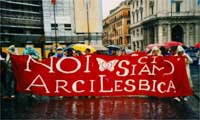"We demand that violence against lesbians be considered a violation of fundamental human rights," wrote Brazilian women.
Discrimination against lesbians is political: it stems from the dominance of heterosexuality as the social norm. In some countries, this dominance is accompanied by violence: physical, verbal, ideological and social. Laws prohibiting the practice of homosexuality are enforced in a number of countries.
Women in Europe called for punishment of "lesbophobic and homophobic discrimination and verbal abuse," the right of lesbian groups to file charges regarding such acts, and that violence against lesbians "be included as an aggravating factor in existing laws." Women in Australia and Québec made similar demands.
Two demands of the World March of Women address the rights of lesbians and gays (V10 and V11). Attempts to reach consensus on these demands finally led to a compromise: each coordinating body would have the choice of whether or not to defend them. They remain, however, an integral part of the world platform of the March.
Some groups talked about their difficulty in addressing an issue that is "taboo" or "not a part of the culture," or that could generate division within the movement.
Women in Muslim countries mentioned similar obstacles. "I cannot adopt a demand that includes the word 'lesbian.' In my country, it means risking prison," said a woman in the October 2001 meeting.
During this meeting, European women suggested to modify the demands concerning lesbians. Fighting for a society that "rejects dictatorship and fundamentalism," they believe that "the marginalization of women, their voices and their rights, particularly in the current context, is cause for great concern. Women who do not conform to the established models or who demand that their rights as citizens be respected are increasingly being targetted by fundamentalists of every stripe." In 2001, European women decided to form a European lesbian network. Women in Salamanca, Spain, are opposing a law that forbids lesbians and single women to use in vitro fertilization.

Another demand of women in these countries was that sexual orientation be taken into account in the granting of refugee status. The United Kingdom made a step in this direction in December 2000.





